On May 21, the Permanent Missions of Japan, Poland, and Turkey to the United Nations, in cooperation with the Stimson Center, convened a half-day conference on the nonproliferation of conventional weapons.
The event was the third in a series of roundtable discussions on non-proliferation and disarmament. The first was held on May 31, 2011 (event summary), and the second on December 5, 2011 (event summary). While the first two seminars focused on general nonproliferation issues, the aim of this conference was to emphasize the unique scourge of conventional arms proliferation. Though the field of non-proliferation and disarmament tends to be dominated by the issues of weapons of mass destruction, the threats to human lives posed by the uncontrolled trade of conventional weapons has recently been attracting attention in the international community. 2012 is an important year in conventional arms control at the UN, as the Arms Trade Treaty will be negotiated in July and the Review Conference of the UN Programme of Action on Small Arms will be held in September. One could say that this seminar took place in a very timely manner. (The conference agenda can be found here.)
Around 100 participants including representatives from over 44 UN Member States and experts from relevant fields attended the event. Other noteworthy participants included experts from several think tanks and foundations and members of the Panel of Experts of relevant Security Council Committees, such as the 1718 Committee on North Korea and the 1737 Committee on Iran. Perhaps due to the proliferation of arms that have continued to affect the recent tensions and conflicts in the Middle East and Africa, attendees of the conference engaged in a lively discussion surrounding these topics. The high turnout and interest displayed could also be attributed to the fact that the meeting was co-hosted by Japan, Poland and Turkey that have been vigorously engaged in confronting proliferation and disarmament at the UN. In addition to the input of Member States, diverse and in-depth knowledge of panelists facilitated the cross-cutting and through-provoking discussions, which is not often found at regular UN meetings. Many attendees expressed their satisfaction to this unique opportunity to engage in an active discussion regarding successes and shortcomings of arms control of conventional arms.
The conference started with the opening remarks by the Ambassadors Lincoln Bloomfield, Jr. of the Stimson Center; Tsuneo Nishida from Japan; Witold Sobków from Poland; and Ertuğrul Apakan from Turkey. Key experts from think tanks in the field of conventional arms, financial service and the media then commenced the first panel by conversing on patterns of arms trade and its financing methods. The panelists discussed the consequences small arms can wreak, not only on the numbers of lives lost, but also on previously functioning societal structures. One expert ventured that the relationship between arms suppliers and importers including brokers is likely to change, given that many countries are developing their own arms industries and many regions, including Asia and Latin America, are becoming suppliers in their own rights. The influx of military surplus was also pointed out as a potential source of unregulated flow of arms. Some expressed hope, however, that transparency and data collection on the arms trade would increase thanks to the presence of information technology and the promise of a new Arms Trade Treaty. The participants also discussed what improvements could be made to curtail the illicit arms trade. A few experts espoused the conviction that a clear definition of brokering of arms in domestic legislation and in the upcoming Arms Trade Treaty was essential, as brokers often handle multiple aspects of transactions. A more frequent and substantive dialogue between non-proliferation experts and the private sector, especially financial services, is also crucial, as employees need to be trained in how to recognize red-flag financial transactions made by their customers.
The second panel included UN experts, scholars as well as members of civil society. The panel delved into the effectiveness of existing instruments designed to halt the flourishing illicit arms trade at the international and regional levels. One panelist described current efforts to overcome the divide between the discussions on arms control and development. It was stressed that besides national effort to control illicit flow of arms, more localized effort to curve the spread of armed violence is crucial. With regard to the multilateral rule making, many stressed the need for the forthcoming Arms Trade Treaty to have high standards in its scope and criteria so that the instrument can become truly effective. Cautious views were also expressed that it would be a mistake to assume any treaty would necessarily complement existing instruments as some of them can be water-down existing effective mechanisms. Both panelists and the attendees acknowledged the difficulty of creating a universally acceptable yet strong instrument that fully address the issue of conventional arms proliferation. Nonetheless, the session reinforced the participants the need to redouble international efforts in this field.
The event also featured a keynote address by Stephen Braun, national investigative correspondent and former National Security Editor of the Associated Press and member of the Los Angeles Times reporting team that won the Pulitzer Prize. Mr. Braun described how illegal arms trade has continued to fueled conflicts around the world through introducing the episode of Viktor Bout. Mr. Braun provided a detailed account on how arms dealers were able to operate while eluding capture or charges, exploiting legal loopholes and lack of attention by many governments until recently. According to Mr. Braun, after the end of the Cold War, many powerful countries had also reduced their presence in states no longer seen as ideological battlegrounds, allowing arms dealers to deliver weapons frequently without detection. It is critical, Mr. Braun declared, for governments to enact tougher laws that can directly target arms dealers in real time, not years later.
At the end of the event, the three co-hosts closed the session by sharing their thoughts on the half-day discussion. Thanking all attendees for their contributions to the event, Ambassador Nishida recalled the grave seriousness of the risk proliferation presents, reminding participants of the threat to Japan, its neighbors, and the world posed by North Korea’s nuclear and missile program. He welcomed the UN Security Council’s recent responses to this threat, but stressed that any new measures adopted would become meaningless if they lacked effective implementation. AmbassadorNishida ended the seminar with a call for a multilateral response and universal participation in arms control efforts.
|
 |
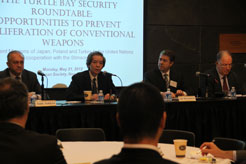
(from left) Ambassador Sobków of Poland, Ambassador Nishida of Japan, Ambassador Bloomfield of the Stimson Center, and Ambassador Apakan of Turkey delivering the opening remarks |
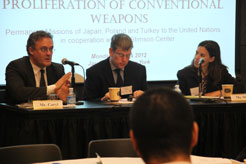
Panelists during the first session discussing patterns and methods of the conventional arms trade |
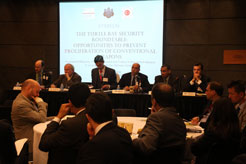
Experts in the second session debating approaches for controlling the arms trade |
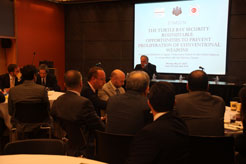
Mr. Stephen Braun delivering his keynote speech |
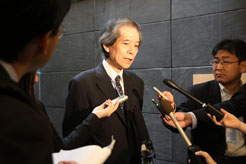
Ambassador Nishida speaking to the press
|
|
|
|
|
|
|

